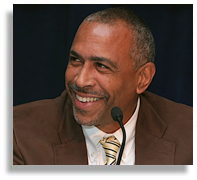Miguel was a standout among his peers so his principal wanted me to meet him. Not only was he on track to graduate as the valedictorian of his class, but he was also a star athlete (shortstop on the baseball team, small forward on the basketball team), an artist (he was starring in the school production of Hamlet), and a leader among his peers. The principal wanted me to meet him because he exemplified the very best in what the school was doing with its students. His demeanor and comportment immediately impressed me. He was confident, articulate and witty, the type of student that in my many years of teaching you would assume was on a path to success. After a few minutes of conversation, I asked him what his plans were after graduation. He explained that because he was undocumented, and at the time New York was one of the states that had not passed its own version of the Dream Act, he would not be able to go to college. Instead, he would continue working at a local fast food restaurant where he was on track to become an assistant manager. I expressed my disappointment and told him that there were several private colleges he could apply to that would be unconcerned about his status, but he let me know that he was determined to work to help his family. Miguel is like many of the undocumented students I have met over the years. Like Miguel, many are hard-working, undeterred by the obstacles they face, and profoundly optimistic about their chance of achieving success in the land of opportunity. Ironically, many of these young people have a greater faith in the American Dream than most Americans. Where poor and working-class Americans often see roadblocks and obstacles, the Dreamers see opportunity. With their relentless optimism, these young people and their families have helped to renew some impoverished neighborhoods, and revived formerly struggling schools like the one Miguel attended. None of them resemble the people described by Attorney General Jeff Sessions when he used terms like “lawlessness” to justify the decision to rescind DACA (Deferred Action for Childhood Arrivals) by claiming that they were contributing to “crime, violence and even terrorism”. Sessions, like President Trump, know what they are doing. Vilifying immigrants in order to justify attacks against them is an old tactic first used by nativists to justify discrimination against the Irish, and later to rationalize that exclusion acts that targeted immigrants from Asia in the late 19th century. What Sessions didn’t say is that DACA recipients have, by law, clean criminal records and the average age of arrival was 6 years old. He also failed to mention that being undocumented is not a “crime.” In fact, according to existing Federal law, being in the United States without papers is not a criminal offense. For people who have never met Miguel or any of the other 800,000 Dreamers who will be affected if DACA is ultimately rescinded, Sessions’ message and Trump’s ongoing attacks against Mexicans and Muslims may very well resonate and seem like a reasonable justification for this action. Fear is after all a powerful mobilizer, and the Trump administration has used it masterfully to inspire their base. However, hope is powerful too, and perhaps if more Americans knew young people like Miguel, and if there were a human face to counter the fear mongering, we would remember that immigration has always been good for America. Miguel and the Dreamers are not unlike the Pilgrims, who also arrived without papers, but saw in America the opportunity to create a better life. By keeping their dream alive we keep the American Dream alive. For a wide variety of reasons, it is clearly in our interest to do so. Dr. Pedro A. Noguera is a Distinguished Professor of Education in the Graduate School of Education and Information Sciences at UCLA and author of “Excellence Through Equity: Five Principles of Courageous Leadership to Guide Achievement for Every Student.” Previously published in Huffington Post and Facing History and Ourselves. Also see:
|
||||||
If you have any thoughts on this or would like to contribute to an ongoing discussion in the  What is New? || Affirmative Action || Art Changes || Autonomy: Chiapas - California || Community Images || Education Rights || E-mail, Opinions and Discussion || En español || Essays from Ireland || Global Eyes || Healthcare || Human Rights/Civil Rights || Piri Thomas || Photo of the Week || QA: Interviews || Region || Rural America || Search || Donate || To be notified of new articles || Survey || In Motion Magazine's Store || In Motion Magazine Staff || In Unity Book of Photos || Links Around The World NPC Productions Copyright © 1995-2017 NPC Productions as a compilation. All Rights Reserved. |


